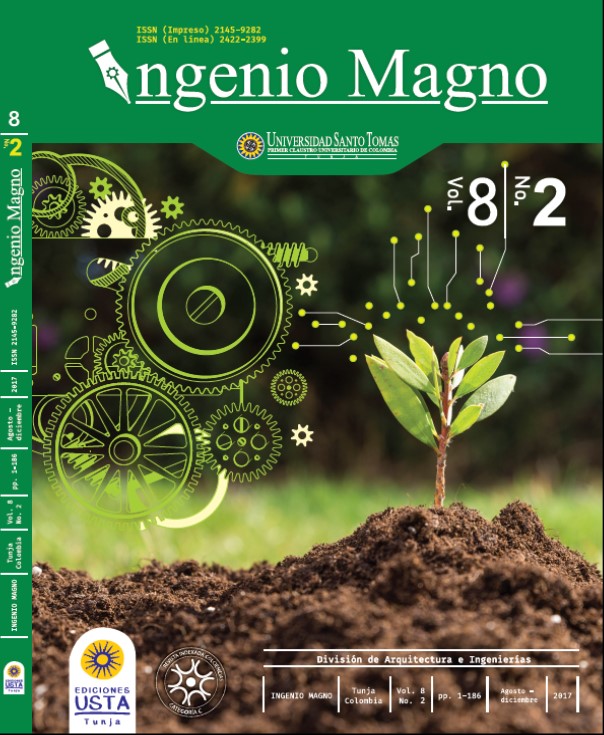Knowledge networks as a technology transfer strategy for adaptation to climate change
Main Article Content
Abstract
Downloads
Article Details
DECLARATION OF ORGINIALITY OF SUBMITTED ARTICLE
With this document, I/We certify that the article submitted for possible publication in the institutional journal INGENIO MAGNO of the Research Center Alberto Magno CIIAM of the University Santo Tomás, Tunja campus, is entirely of my(our) own writing, and is a product of my(our) direct intellectual contribution to knowledge.
All data and references to completed publications are duly identified with their respective bibliographical entries and in the citations thus highlighted. If any adjustment or correction is needed, I(we) will contact the journal authorities in advance.
Due to that stated above, I(we) declare that the entirety of the submitted material is in accordance with applicable laws regarding intellectual and industrial property, and therefore, I(we) hold myself(ourselves) responsible for any complaint related to it.
If the submitted article is published, I(we) declare that I(we) fully relinquish publishing rights of the article to the University Santo Tomás, Tunja campus. As remuneration for this relinquishment of rights, I(we) declare my(our) agreement to receive two (2) copies of the edition of the journal in which my(our) article appears.
References
Al-Ghamdi, H. A. K., y Al-Ghamdi, A. A. K. (2015). The Role of Virtual Communities of Practice in Knowledge Management Using Web 2.0. Procedia Computer Science, 65(Iccmit), 406–411.
Albrieu, J., Barth, I., Torres, G., Argerich, M., y Maldonado, I. (2013). Cambió el clima. Herramientas para abordar la adaptación al cambio climático desde la extensión. Montevideo.
Borgatti, S., Everett, M., y Johnson, J. (2013). Analyzing social networks. SAGE Publications Limited.Aldunce, P., Beilin, R., Howden, M., & Handmer, J. (2015). Resilience for disaster risk management in a changing climate: Practitioners’ frames and practices. Global Environmental Change, 30, 1–11. https://doi.org/10.1016/j.gloenvcha.2014.10.010
CORPOICA. (2016). Planes de manejo agroclimático integrado de los sistemas productivos priorizados. Bogotá: Reducción del Riesgo y Adaptación al Cambio Climático.
Colombia, Congreso de la República. Ley 607 de 2000. Capítulo I Definiciones y Principios (2000).
Cuevas Reyes, V., Espejel García, A., Barrera Rodríguez, A., y Sosa Montes, M. (2014). Redes sociales y actores relevantes para la difusión de innovaciones y conocimiento en los territorios rurales, V(4), 1–14.
Dolinska, A., y D’Aquino, P. (2016). Farmers as agents in innovation systems. Empowering farmers for innovation through communities of practice. Agricultural Systems, 142, 122–130.
Duguid, P. (2008). “The Art of Knowing”: Social and Tacit Dimensions of Knowledge and the Limits of the Community of Practice. In Community, Economic Creativity, and Organi-zation. Oxford University Press.
FAO. (2013). Climate Smart Agriculture.
Fenton, P. (2015). The role of port cities and transnational municipal networks in efforts to re-duce greenhouse gas emissions on land and at sea from shipping - An assessment of the World Ports Climate Initiative. Marine Policy, 1–7.
Hanneman, R. a, y Riddle, M. (2005). Introduction to Social Network Methods. Riverside, CA: University of California, Riverside. On-Line Textbook, 46(7), 5128–30.
Iglesias, A., y Garrote, L. (2015). Adaptation strategies for agricultural water management under climate change in Europe. Agricultural Water Management, 155, 113–124.
Isaac, M. E. (2012). Agricultural information exchange and organizational ties: The effect of network topology on managing agrodiversity. Agricultural Systems, 109, 9–15.
Kalafatis, S. E., Lemos, M. C., Lo, Y.-J., y Frank, K. a. (2015). Increasing information usability for climate adaptation: The role of knowledge networks and communities of practice. Global Environmental Change, 32, 30–39.
Lei, Y., Zhang, H., Chen, F., y Zhang, L. (2016). How rural land use management facilitates drought risk adaptation in a changing climate - A case study in arid northern China. The Scien-ce of the Total Environment, 550, 192–199.
MADR. (2014). Evaluaciones Agropecuarias Municipales.
Pimienta Lastra, R. (2000). Encuestas probabilísticas vs . no probabilísticas. Política Y Cultura, (13), 263–276.
Santoyo. (2014). Sistemas de extensión para la innovación en el sector rural marginado En Gestión de redes de innovación en zonas rurales marginadas.
Sanz, L. (2003). Análisis de redes sociales: o cómo representar las estructuras sociales subyacentes. Apuntes de Ciencia Y Tecnología, 7, 10.
Theodorakopoulos, N., Bennett, D., y Janeth, S. D. (2012). Technovation Transferring tech-nology from university to rural industry within a developing economy context : The case for nurturing communities of practice, 32, 550–559.
Velásquez, A., y Aguilar Gallegos, N. (2005). Manual Introductorio al Análisis de Redes So-ciales. Medidas de Centralidad.
Williner, A., Sandoval, C., Frias, M., y Pérez, J. (2012). Redes y pactos sociales territoriales en América Latina y el Caribe: sugerencias metodológicas para su construcción. Santiago de Chile: Naciones Unidas.

